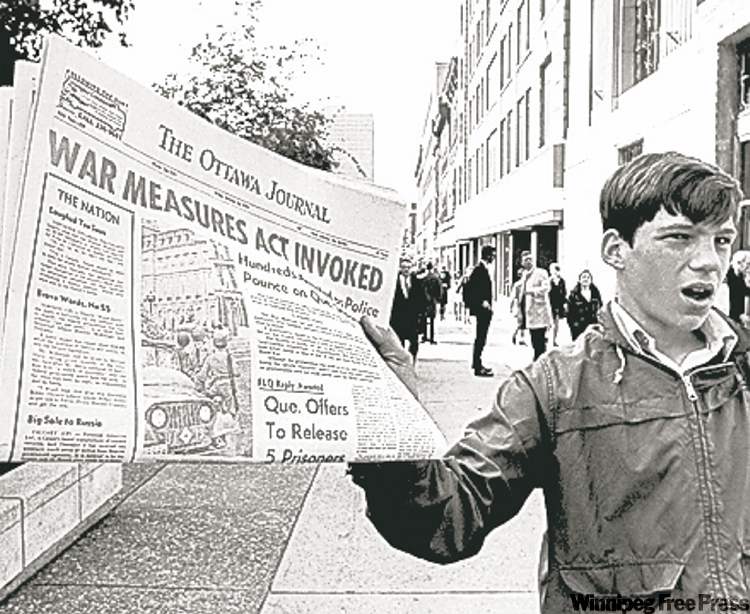FLQ didn’t mean to kill people: Quebec author
Bombing victims described as 'collateral damage'
Advertisement
Read this article for free:
or
Already have an account? Log in here »
To continue reading, please subscribe:
Monthly Digital Subscription
$1 per week for 24 weeks*
- Enjoy unlimited reading on winnipegfreepress.com
- Read the E-Edition, our digital replica newspaper
- Access News Break, our award-winning app
- Play interactive puzzles
*Billed as $4.00 plus GST every four weeks. After 24 weeks, price increases to the regular rate of $19.00 plus GST every four weeks. Offer available to new and qualified returning subscribers only. Cancel any time.
Monthly Digital Subscription
$4.75/week*
- Enjoy unlimited reading on winnipegfreepress.com
- Read the E-Edition, our digital replica newspaper
- Access News Break, our award-winning app
- Play interactive puzzles
*Billed as $19 plus GST every four weeks. Cancel any time.
To continue reading, please subscribe:
Add Free Press access to your Brandon Sun subscription for only an additional
$1 for the first 4 weeks*
*Your next subscription payment will increase by $1.00 and you will be charged $16.99 plus GST for four weeks. After four weeks, your payment will increase to $23.99 plus GST every four weeks.
Read unlimited articles for free today:
or
Already have an account? Log in here »
Hey there, time traveller!
This article was published 15/10/2010 (5475 days ago), so information in it may no longer be current.
MONTREAL — An author of Quebec’s high-school history textbooks says the FLQ never intended to kill people and its bombing victims were “collateral damage” in its push for independence.
Raymond Bedard also argues that Pierre Laporte’s death during the October Crisis 40 years ago this weekend was an accident — not murder.
Many in English Canada might be surprised to hear those views expressed by an author of history textbooks and a man who has seen thousands of students pass through his class in his 30 years as a teacher.

But Bedard’s take on the events of 1970 offers a glimpse into the different lessons taught in the province’s history classes.
Bedard says while there’s no excuse for Laporte’s death, he does not believe it was intentional.
“Even if Laporte’s death was really regrettable, it wasn’t a death that was planned,” said Bedard, who wrote two editions of provincially approved textbooks with a longtime colleague who he says shares many of his views.
“It was not a kidnapping where they said, ‘We will mistreat him for a while and then assassinate him.’ ”
On Oct. 10, 1970, members of the Front de liberation du Quebec kidnapped Laporte, the province’s labour minister at the time, in Montreal.
British diplomat James Cross had been abducted five days earlier.
The kidnappings prompted then-prime minister Pierre Elliott Trudeau to invoke the War Measures Act on Oct. 16, a day before Laporte’s body was discovered stuffed in the trunk of a car.
Two FLQ members — Paul Rose and Francis Simard — were eventually convicted of murder in Laporte’s death and sentenced to life behind bars.
Both men were released from prison in 1982.
The FLQ also set off about 100 bombs between 1963 and 1970, resulting in a handful of deaths.
When asked about the blasts, Bedard said the explosions were a sign of the fiery social movements of the times, referring to deadly incidents in Italy and California in the 1960s.
“Each time, there was never any intention of killing people,” he said of the FLQ bombings.
“Of course, like the American army says, there was collateral damage.”
Bedard said the Quebec curriculum does not put a lot of emphasis on the October Crisis, perhaps 45 minutes of class time out the entire school year.
– The Canadian Press

